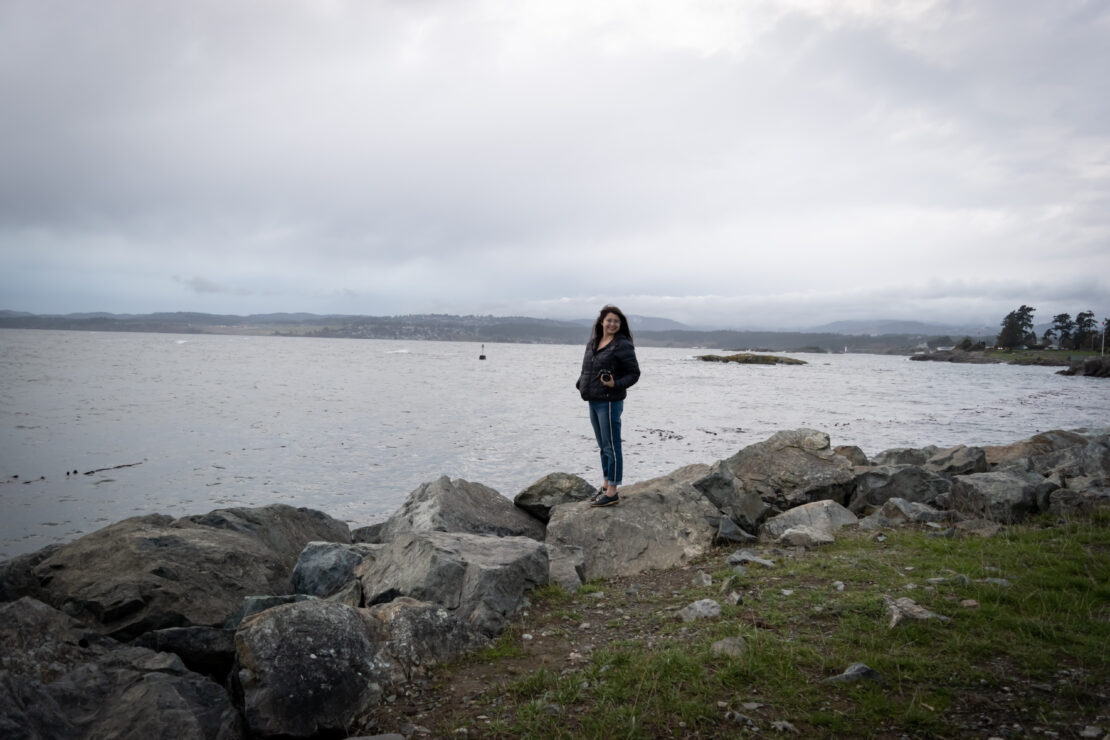From UVic, to the Tyee and IndigiNews

As a child, Jenessa Joy Klukas was already a storyteller. She describes her mother’s attempts at hurrying her along, wanting to get to the end of whatever she was describing to her. But, Klukas writes in her recent article for IndigiNews, she wanted to include the details, wanted to say everything.
“It has always felt like I needed to write and I needed to tell stories,” said Klukas in a Zoom interview on a spring day. She warns me in the interview that she’s chatty, and she is, but she is also deliberate with her words, choosing them with care.
“If I wasn’t doing journalism as a job, I would still be writing all the time,” she said with a smile.
A recent graduate from UVic’s fine arts department, Klukas has written for the independent news outlet the Tyee as a fellow and has been working at IndigiNews as their Education and Child Welfare Storyteller. Although only at the start of her career, Klukas has found her voice through writing on child care and hopes to continue to develop as an investigative, longform journalist.
“I was adopted at a very young age and that was a very formative part of my life and who I am and helped lead me to be passionate about child welfare,” said Klukas, who is Xaxli’p and Métis and grew up on Haisla territory in Kitimat B.C. Her own experience, as well as her 11 years of working in child care, stirred her to use her skill in writing to uplift the stories of communities and people so often ignored by mainstream news cycles.
“I had lots of family that survived the child welfare system and foster care system in Canada,” said Klukas. “I’m very passionate about ensuring the children are safe and protected and nurtured fairly and with compassion.”
IndigiNews is a relatively new women-led Indigenous news outlet based in the Okanagan and Vancouver Island. Dedicated to decolonizing the media and practicing trauma-informed reporting, IndigiNews holds space in the Canadian media landscape for Indigenous stories to be told and brought to the forefront. Klukas says that the responses from the communities she writes on and for have been positive.
“It’s very nice to go out in the community and be like ‘I’m covering this for IndigiNews and the first reaction is ‘that’s so great, I’m so glad you’re here.'”
Eden Fineday, the business aunty for IndigiNews, says that IndigiNews incorporates Indigenous knowledge and practices into their work. For instance, they use different titles such as storyteller and storyshaper.
“It’s been wonderful seeing these just incredibly powerful, beautiful women writing about their lives, sharing what they know,” said Fineday, who is a Cree person from the Treaty Six territory, from the Sweetgrass First Nation. “There’s a lot of wisdom in this group of women, a lot of life experience, and a lot of cultural knowledge.”
According to both Fineday and Klukas, IndigiNews is a necessary force in the media. As Fineday is responsible for the funding for IndigiNews, she feels a responsibility to the writers and the communities they cover.
“I got to get this money so that IndigiNews can keep sharing these stories that other people don’t share. And stories that most other news organizations aren’t interested in because they are not tragic enough, or sexy enough,” she said.
“It’s slow news. A lot of what we share is actually more like traditional knowledge.”
Klukas is currently changing up her role at IndigiNews to allow for growth, and hopes to do more investigative journalism pieces. To Indigenous journalists who are just starting out, her advice is to write what you are passionate about.
“Don’t be pressured to write about Indigenous stories just because you are Indigenous,” she said.
“If you have a passion for another area of journalism, [being Indigenous ] shouldn’t necessarily mean you have to write on Indigenous news. I think there is a lot of pressure to be that.”







